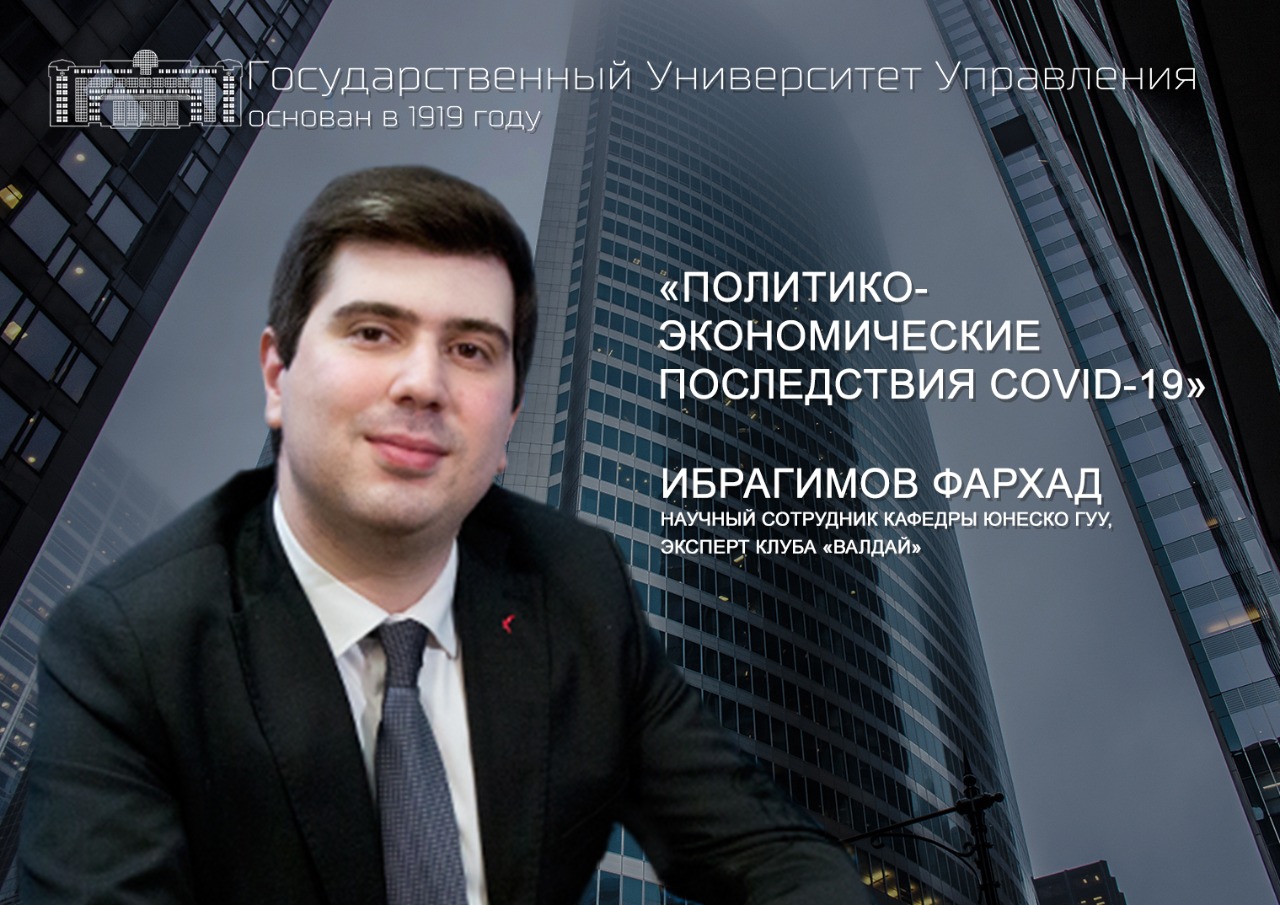
Farhad Ibragimov: The Novel Coronavirus Disease Marks the Beginning of Large-Scale Transformations
The State University of Management held an online lecture on the topic ‘The Political and Economic Consequences of COVID-19’ hosted by Farhad Ibragimov, researcher at the UNESCO Chair ‘Societal, Legal and Ethical Frameworking of Knowledge Societies’. During the lecture, Ibragimov provided his expert analysis of the opinions and assessments of leading politicians, economists and writers on the topic. The key points of the lecture are presented in our article.
An Underestimated Virus
There are a large number of activities underway devoted to combating the novel coronavirus in 2020. Initially, reports coming from the distant Chinese city of Wuhan in early January were treated with scepticism by many, including virologists in Europe, Russia and the United States. Many of them were convinced that the danger posed by the virus was not extreme as the world had already experienced something similar in 2003 with the SARS outbreak in China.
Over 6 months, the SARS virus caused 5,327 severe cases of acute respiratory distress syndrome, 349 of which proved to be fatal. Scientists suggested that the novel coronavirus, also referred to as COVID-19, would share the same fate as its many predecessors and limit itself to a similar number of infections primarily in the Asia-Pacific region. Subsequently, as the situation escalated, the World Health Organisation declared COVID-19 a pandemic. This has required all countries around the globe to isolate themselves from each other, which has inevitably affected both the global economy and world order as a whole.
How Will the Coronavirus Affect the Balance of Political Power?
According to Henry Kissinger, ‘When the COVID-19 is over, many countries’ institutions will be perceived as having failed. The reality is the world will never be the same after the coronavirus.’ Prominent American political scientist Joseph Nye Jr disagrees with him. In his view, ‘the coronavirus pandemic is unlikely to cause global problems’. The expert community is evidently divided into two camps.
The former believes that once the pandemic is over, we will find ourselves in a different world based on new values that could potentially transform the existing world order. From the point of view of the experts, a decisive role in restoring world order will be played by Russia and China in addition to the United States. At the same time, political scientists note that the collapse of the existing world order had started even before the pandemic, and that the coronavirus has merely highlighted the flaws that had already built up in international relations. This is evident in the lack of proper unity within various international alliances, for example, within the European Union, which has practically left Italy to fight the major pandemic on its own. Instead, a significant role in reducing the spread of the virus has been played by Russia – a country that has been repeatedly labelled a main rival by the EU over the past several years.
On the other hand, experts from the opposing camp believe that we should not expect any significant changes in the world order resulting from the global pandemic. After it ends, they predict, everything will remain largely as it was with only minor alterations.
What Conclusions Can We Make about the Economy
When discussing economic consequences, it is important to note several fundamental problems that have arisen due to the global pandemic and subsequent lockdown:
- Stock market crash
- Sharp drop in oil prices
- Deep and prolonged recession
- Bankruptcy of large corporations
- Mass unemployment
According to the Ministry of Economic Development of the Russian Federation, the most affected sectors of the economy are:
- Air and road transport
- Leisure and entertainment
- Tourism, culture and sport
- Hotels
- Expos
- Catering
- Domestic services
April 2020 was a historic month for the global economy, with oil prices hitting a negative number for the first time. This meant that people selling futures had to pay buyers – not the other way round. The drop in price exceeded 300%. Everything that seemed unthinkable to economists before has become possible thanks to the COVID-19 pandemic. Despite the quick return of the price of Brent Crude to normal ($34.51 per barrel as of 18 May 2020), it still continues to show fluctuation and instability. For this reason, analysts are predicting the recurrence of similar scenarios if the spread of the pandemic does not slow soon, and if self-isolation regimes around the world continue for a prolonged period of time. The International Monetary Fund also notes a recession in the global economy, which has contracted by 3% and is set to lose at least $9 trillion in value as a result of the coronavirus even in the event of a rapid recovery.
The ‘Coronacrisis’ – Is It That Bad?
Predictions of a further economic slide into recession have led some media to coin the term ‘coronacrisis’ to describe the consequences of COVID-19 and its influence on society. The ‘coronacrisis’ also implies a significant decrease in GDP.
The famous French writer and philosopher Alain de Benoist, theorist behind the Nouvelle Droite movement, notes in an article published in Valeurs Actuelles that the ‘coronacrisis’ will not be the end of the world but rather the end of a world. However, COVID-19 has still managed to affect each of us at an individual level. The novel coronavirus marks the beginning of large-scale transformations that we are already starting to witness. No expert can accurately predict how radically our lives will change after the end of the pandemic, but we are certain that we will not be returning to the world we lived in before January–February 2020.
The full recording of the lecture can be found on YouTube
Подпишись на тг-канал "Наш ГУУ" Дата публикации: 18.05.2020
Дата публикации: 18.05.2020


